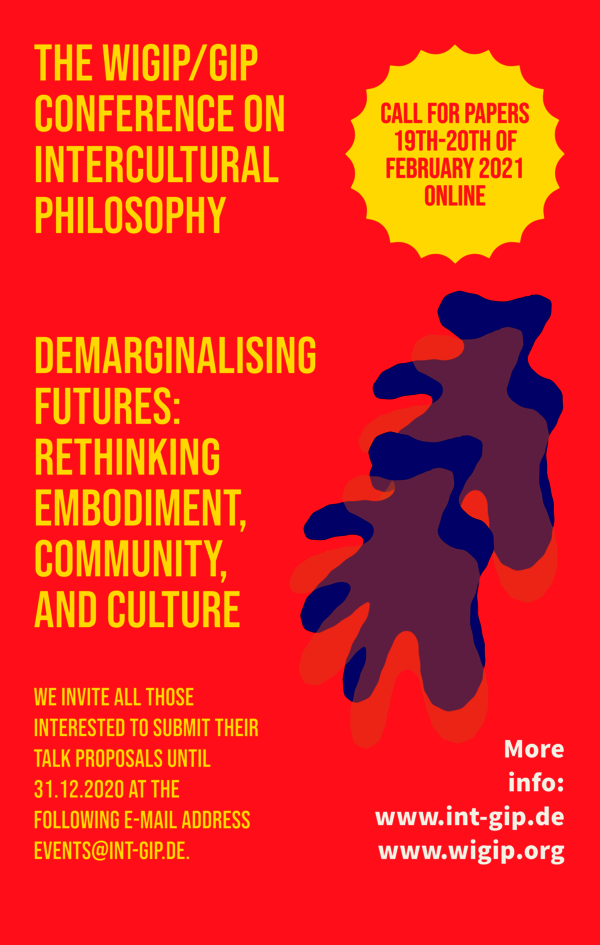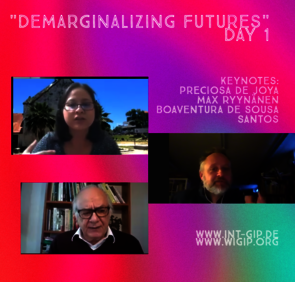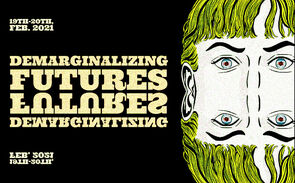



Demarginalising Futures: Rethinking Embodiment, Community, and Culture
Thank you very much to all of you who joined the conference "Demarginalizing Futures"! It was a great online experiment with amazing discussions and people from all over the world.
You can check the website of the conference here:
https://sites.google.com/view/demarginalizingfutures/
Keynote speakers:
-Dr. Boaventura de Sousa Santos
-Dr. Preciosa de Joya
-Dr. Dominic Lopes
-Dr. Max Ryynänen
-Dr. Raúl Trejo Villalobos
-Brian Goeltzenleuchter
19th-20th of February 2021
Online
The WiGiP/GiP
Conference on Intercultural Philosophy
Demarginalising Futures: Rethinking Embodiment, Community, and Culture
Abstract:
Techno-utopias, dystopias, climatic eschatologies, and various other representations of possible futures entangle themselves in the different imaginaries which surround us in our day to day lives and are generated by politics, media, or philosophy. Such narratives about the future are more than often centred on European concepts of technological progress and ignore representations of future stemming from marginalised political or societal actors. We wish therefore to promote an increase of philosophical and multidisciplinary attention to the above marginalised narratives of the future. To this scope, we invite proposals from a broad horizon of backgrounds on the main topic of ways to represent future societies in a demarginalising way. We will refer to all such mechanisms as ‘futurisms’, thus aligning ourselves with postcolonial trends in aesthetics that reframe the ‘eurocentric’ term futurism in a demarginalising, decolonial way.
The term ‘futurism’ is usually used in post-colonial contexts to refer to certain sets of aesthetic practices that aim to re-appropriate the discourses of science fiction and technology from the point of view of those who were historically excluded from the narratives of civilizational progress (see Dillon 2012; Newman Fricke 2019). Examples of such movements are ‘afro-futurism’, ‘chicanx-futurism’, ‘Asia-futurism’ (including the so-called ‘sino-futurism’), ‘gulf-futurism’, etc.
Hence, although the term ‘futurism’ in all its variants has been employed mostly in the field of cultural studies, we think that philosophy should also take this opportunity to reflect on the way in which the narratives of future and progress can be re-thought from other perspectives. Our representations of the future are usually accompanied by certain notions of technological growth, political participation, and cultural internationalization. These types of representations lead however to dichotomies in the way we envision futures: our imaginaries are populated with AI-human interactions, cybernetic gadgets, experiences of augmented reality, but also environmental catastrophes, mass-surveillance anxieties and new forms of migration and ethnical persecution, among others. We find ourselves therefore in front of increasingly conflicting representations of the future which pressingly challenge us to critically evaluate and re-appropriate these imaginaries.
Subaltern cultures have been systematically excluded from the ‘future’, being instead portrayed as technologically and socially underdeveloped. Something similar happens with their philosophies, which usually appear as taxonomical oddities classified as ‘wisdom’, ‘sageness’, ‘thought’, ‘popular culture’ or ‘religion’, and often play a marginal role in the mainstream representation of future societies. This seems paradoxical since it is precisely in places like the global south where we find political initiatives that try to marry ecological sustainability with political and economic solidarity in creative and innovative ways. For this reason, we would like to address these problems from the expanded perspective of these marginalised futurisms, but also engage in a critical assessment of futurism and all representations of future - does it do justice to subaltern voices or does it promote a dichotomy-laden politics of identity?
Given that we understand futurism in an expanded way that includes a large variety of thinking about the future, we invite proposals that investigate and highlight the diversity of thinking and representing future societies. As a guide for possible topics please refer to the following list:
Topic suggestions
-Non-western representations of the future
-Embodiment and subjectivity (the future of the body)
-Political imagination (utopias, dystopias, etc.)
-Social economy, popular emancipatory initiatives for the future
-Art and design for future
-Post-colonial pop and urban culture
-Cosmotechnics, new media and technology
-Ecological thinking, Anthropocene
-Indigenous worldviews and science
-The future of intercultural philosophy and intercultural aesthetics
-Animism, panpsychism, shamanism as tools for visions about the future, etc.
Applications
We invite all those interested - especially young scholars - to submit their talk proposals on the topics described above until 31.12.2020 at the following e-mail addressevents@int-gip.de.
Submissions should include:
-An abstract between 300 and 500 words
-A short academic profile including contact information and institutional affiliation
All talks and discussions will be in English
While the conference is focused on philosophical inquiries of futurism we welcome and encourage submissions from all disciplines.
Conference structure
In order to take away from the strain of online presence the conference will be structured in two parts. An asynchronous part will give all participants the chance to hear all talks in advance during a two-week period. This will act as a base for discussion for the second synchronous part of the conference which will consist of zoom meetings.
Organization
This conference is a joint effort by the Wiener Gesellschaft für interkulturelle Philosophie (WiGiP) and the Gesellschaft für interkulturelle Philosophie (GiP).
-Dr. Fernando Wirtz -CIIS Postdoctoral Fellow and Treasurer of GiP
-Dr. Adrian Razvan Sandru - Postdoctoral Researcher at the Champalimaud Center for the Research of the Unknown, Lisbon
-Univ.-Doz. DDr. Mădălina Diaconu, University of Vienna, editor-in-chief of “polylog. Zeitschrift für interkulturelles Philosophieren”
For any questions, please direct your inquiries at the following address: events@int-gip.de